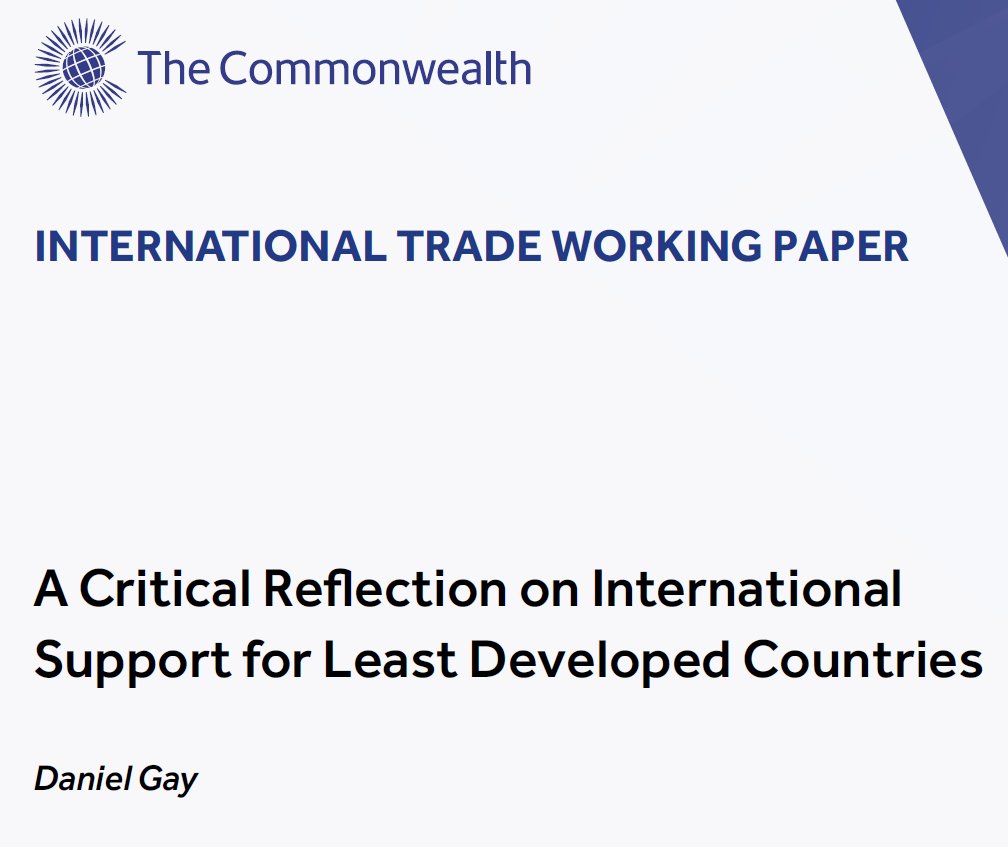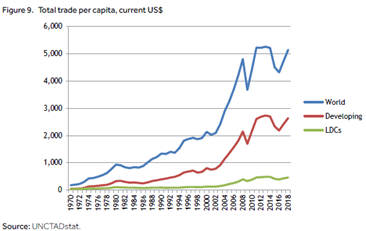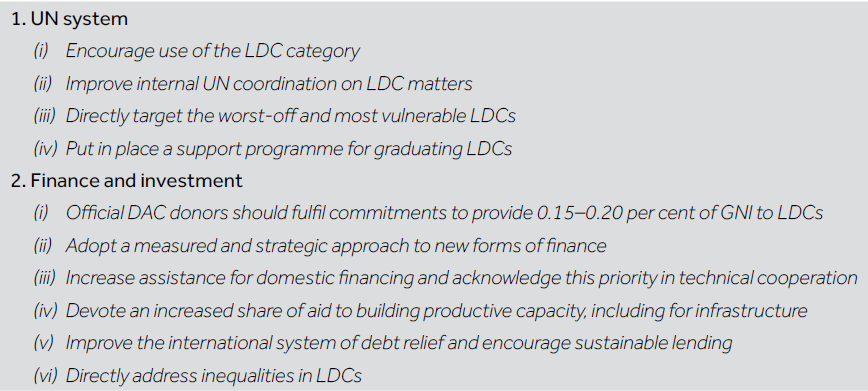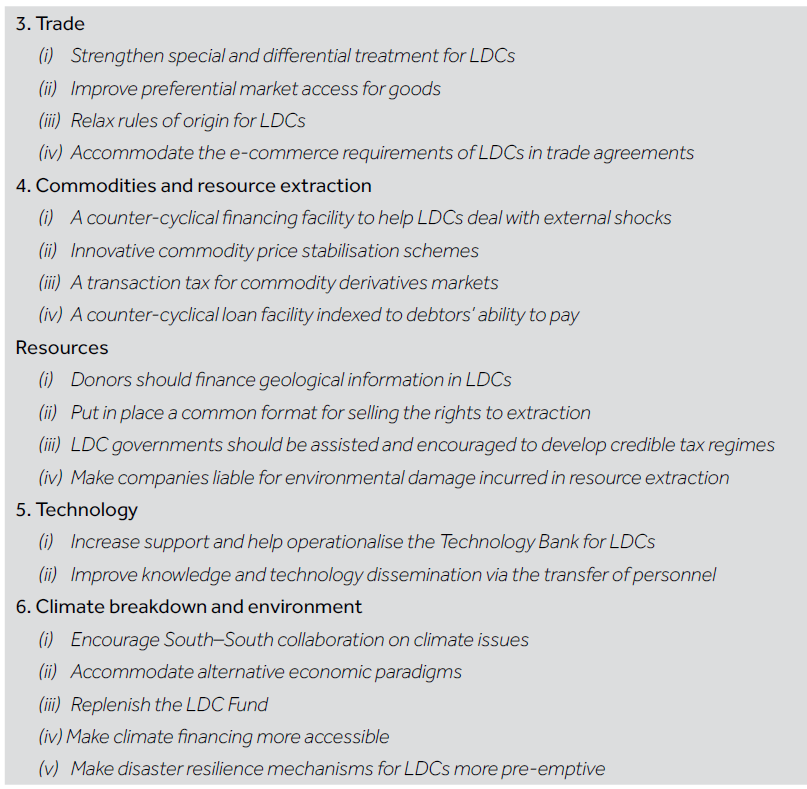1/19. I’ve just published a new @commonwealthsec paper looking critically at international support for the world& #39;s 47 least developed countries (LDCs). It’s a bit of a monster, so I’m going to tweet the main points in this (monster) thread.
https://www.thecommonwealth-ilibrary.org/a-critical-reflection-on-international-support-for-least-developed-countries_4aaec566-en.pdf?itemId=%2Fcontent%2Fpaper%2F4aaec566-en&mimeType=pdf">https://www.thecommonwealth-ilibrary.org/a-critica... #globaldev
https://www.thecommonwealth-ilibrary.org/a-critical-reflection-on-international-support-for-least-developed-countries_4aaec566-en.pdf?itemId=%2Fcontent%2Fpaper%2F4aaec566-en&mimeType=pdf">https://www.thecommonwealth-ilibrary.org/a-critica... #globaldev
2. Support for LDCs comes in the form of trade, aid and help taking part in the international system. The main source of support is duty-free, quota-free access to other countries and regions, in particular the EU. This means most LDC exporters don’t pay taxes on their exports..
3. ...or face limits on how much they can export. LDCs also get a certain amount of official development assistance and climate financing; pay lower contributions to the UN budget; and get a string of smaller ad hoc benefits like free travel to certain international meetings.
4. A distinct, and often unchallenged, theory underlies these support measures. It says that getting rid of barriers to international trade and liberalising the national economy will prompt spontaneous catch-up and sustainable development. Exposure to undistorted international...
5. ...prices is supposed to incentivise companies in LDCs to reorganise production more efficiently.
Unfortunately, though, the theory has proven wrong. The support measures haven’t worked. Some LDC governments managed their economies quite well until...
Unfortunately, though, the theory has proven wrong. The support measures haven’t worked. Some LDC governments managed their economies quite well until...
6. ... the current crisis, but key international targets for the LDC group were always going to be missed. Even before Covid, several LDC economies were shrinking and becoming more vulnerable. LDCs are falling further behind other developing economies and the rest of the world.
7. Despite the emphasis on market access, trade and investment is on average falling as a share of economic output in LDCs. Duty-free, quota-free market access has benefited a select few countries. Official development assistance to LDCs has dropped below its 2016 peak.
8. The situation is now catastrophic in many LDCs, which were only just hanging on, & have always been hugely vulnerable to things coming from core countries, like huge commodity & oil price volatility of the last 20 yrs, the collapse in trade after the global financial crisis...
9. ... and now Covid. This is on top of regular hurricanes/cyclones, droughts and other climate-related disasters. According to the official UN measure, in 20 of the 47 LDCs, economic vulnerability got worse from 2015 to 2018.
10. Vulnerability is an inherent & functional feature of the existing global economy. It& #39;s the norm, not a temporary affliction or an aberration that aid can ameliorate. The way the global economy is currently organised, peripheral countries will always be vulnerable to shocks.
11. One of the main reasons why international support for LDCs haven’t worked is not only that they’re unambitious (true), it’s that the underlying theory is deficient. Exports don’t rise magically if you get rid of taxes or quotas. Even countries like Bangladesh that have...
12. ...benefited from market access used strongly interventionist garment-sector industrial policies. The assumptions underlying mainstream theory are so unrealistic as to make policies based on them mostly useless.
13. This isn’t to say that trade or global market integration are bad -- quite the opposite: most developing countries traded their way out of poverty -- it’s that exports happen because of active government policies to stimulate supply in useful ways.
14. In LDCs, exports are a question of productive capacities not just international demand. This needs smart, strategic industrial policies. It also requires much better global coordination; help building public revenues; measures to transfer technology & accumulate capital...
15. ; debt forgiveness & the prevention of new debt-build-up; and ways of shielding LDCs from shocks.
The kind of theory that& #39;s underpinned international support can& #39;t be justified any longer. The data are stark and the evidence undisputable. LDCs are falling further behind;
The kind of theory that& #39;s underpinned international support can& #39;t be justified any longer. The data are stark and the evidence undisputable. LDCs are falling further behind;
16. ...they’re not narrowing the gap.
A new approach is needed. My paper draws on existing sources to make practical proposals about how to start improving things. The paper argues for reform of the multilateral architecture,
A new approach is needed. My paper draws on existing sources to make practical proposals about how to start improving things. The paper argues for reform of the multilateral architecture,
17. ...outlining practical measures in six areas:
- The UN system
- Finance and investment
- Trade
- Commodities and resource extraction
- Technology
- Climate breakdown and environment.
- The UN system
- Finance and investment
- Trade
- Commodities and resource extraction
- Technology
- Climate breakdown and environment.
18. I won& #39;t elaborate each proposal here, but the paper (read it) argues for a range of options based on national ownership and better international coordination, acknowledging the right of governments to choose pathways appropriate to the national context and vision. A summary:

 Read on Twitter
Read on Twitter






